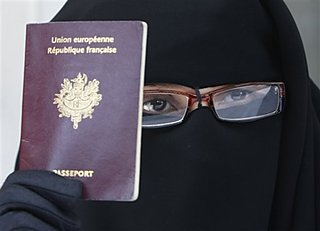 The recent decision of France’s lower house to ban the full-face veil in public places has, yet again, brought the veil debate to the forefront. Belgium took the lead on the matter, but as the reoccurrence of the debate in practically every European country has amply demonstrated, the “burqa ban” controversy is a pan-European phenomenon.
The recent decision of France’s lower house to ban the full-face veil in public places has, yet again, brought the veil debate to the forefront. Belgium took the lead on the matter, but as the reoccurrence of the debate in practically every European country has amply demonstrated, the “burqa ban” controversy is a pan-European phenomenon.
Considering that the debate has been infused with arguments that focus on core Western values – individual rights, women’s rights, the secular trumping the religious – it is not surprising that the discussion rages from the Mediterranean to the North Sea. But what is the big deal with this piece of cloth when, strictly speaking, it only is relevant to a handful of women?
The crux of the matter is that a great deal of Europeans view Islam as being inherently political, thus any symbol of Islam becomes a political statement. As Syrian-born Danish MP Naser Khader stated during an interview with CNN’s Christiane Amanpour; “The majority (of Europeans) don’t want the political Islam and the symbols of political Islam. And the burqa is part of the political Islam that the majority rejects.”
In Europe, hiding your face behind a veil is viewed by many as a rejection of the values of the society within which you live. The line of thinking can seem peculiar, especially to (most) Americans, who consider the burqa ban contradictory to the basic right of religious freedom. Obviously, it is possible for two cultures who share the same basic principles of governance, to reach very different conclusions on the compatibility of the burqa with the democratic state.
Full disclosure. This blogger leans toward the American interpretation. There are obvious problems in a line of thought that conflates anti-democratic values and Islam. First and foremost, a ban seems contradictory to the very values that supposedly are being protected. Coercing women into giving up religious symbols in the name of liberating the individual brings to mind the infamous Vietnam-era quote, “We had to destroy the village in order to liberate it.” The comparison is in some ways a stretch, but nevertheless, liberty – be it with regards to a country or individual – cannot be imposed, only encouraged.
Although a major theme surrounding the burqa debate revolves around lack of integration, a ban would encourage the very fragmentation of ethnically mixed communities that the legislation is supposed to remedy. Incidentally, 25 % of the approximately 2000 French Muslims who wear a form of full-face veil are ethnically French Muslim converts. Although I am sure most Westerners would be critical of these women’s choice of religious expression, few would question that is their right to make that choice for themselves.
The symbolic value of the ban is enormous. It confirms the perception of a “Clash of Civilizations” type mentality among Christians and Muslims alike, and strengthens anti-democratic forces. Although there are instances where a full-face veil is unacceptable, i.e. in an airport or classroom, administrative safeguards are more than adequate in these situations. That European politicians resort to arguments involving situations where a burqa somehow was an impediment to justice (e.g. bank robberies involving a burqa) proves the hollowness of the argument. It is, of course, not bank robberies that are the issue – why then discuss them? Women’s rights are a worthy cause, as is the championing of all values that celebrate individual liberties. That is why the burqa ban is the wrong thing to do.